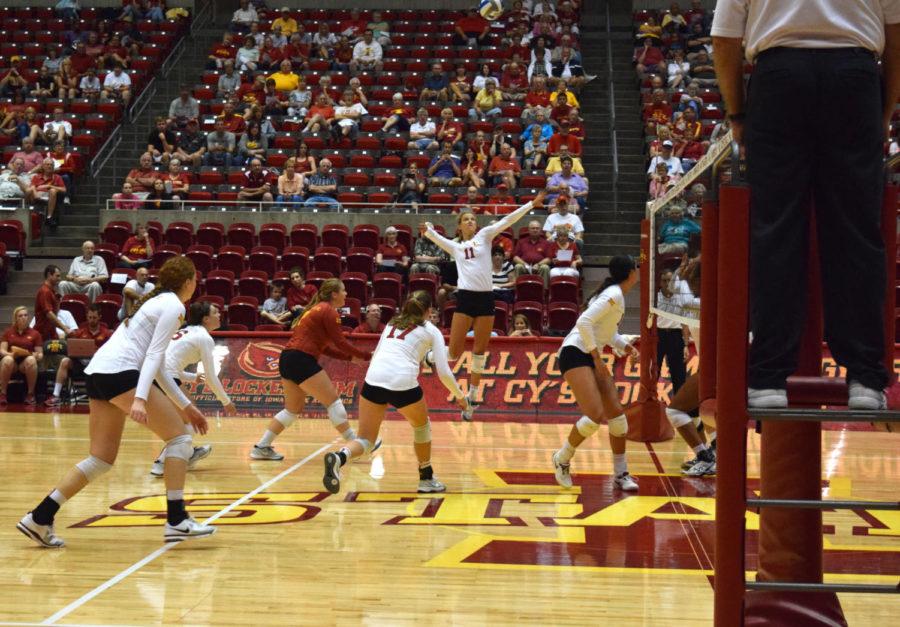ISU volleyball focuses on communication
Sophomore outside hitter Ciara Capezio attacks the ball during the Cardinal and Gold Scrimmage on Aug. 23.
August 24, 2014
One thing ISU volleyball head coach Christy Johnson-Lynch wants to avoid in the upcoming season is a failure to communicate.
“Volleyball is one of the few sports where the ball never stops moving. You only get to stop it when you go to serve; otherwise the ball is moving, so communication is key,” Johnson-Lynch said. “I think communication before and after the play is just as important as communication during the play.”
As a setter, a heavy portion of the communicative burden falls on the shoulders of sophomore transfer Suzanne Horner. Horner talked about her multiple jobs on the court, including sending clear messages to her teammates while at the same time sending mixed messages to the other side of the net.
“As a setter, I communicate with my hitters on what I want them to hit,” Horner said. “There are so many different sets in volleyball and my job is to tell each hitter what they are going to hit so we can kind of psyche out the other team, so they are not sure quite where we are going.”
Not all of the interaction is verbal, however, as Horner said sign language is also an important aspect of implementing strategy mid-set.
The Cyclones often use shorthand to describe what they are seeing across the net, be it the opposing hitters’ tendencies or reading the court and deciding which blocking scheme to implement.
“We have hand signals for all of our sets,” Horner said. “Whenever we send signals, we try to make sure [our opponents] do not see it. We send a lot of signals behind our backs.”
Horner added that covert precautions must occasionally be foregone in favor of complete clarity.
“Sometimes, you just [have] to say it so everybody knows,” Horner said. “The other team is doing the same thing so you can pick little things up, but you try to give away as little as possible.”
During the preseason, as freshmen arrive and new players find themselves in the rotation, communication plays a key role in teammates familiarizing themselves with one another while defining their roles.
“It is very easy to be timid … when you are a freshman and you do not know anyone. That is not a good excuse, but it is a reality,” said sophomore Ciara Capezio, who dealt with being a newcomer in 2013. “But if you come in and talk, it does not really matter what you say. It just helps everyone else know that you know what is going on and makes it easier for everyone else.”
Johnson-Lynch said that good examples of vocal leaders on the team are senior Victoria Hurtt, junior Caitlin Nolan and sophomore Natalie Vondrak, all of whom derive their verbal nature from a deep-seeded competitiveness.
Throughout the year, that competitive and chatty nature may spread to some of those Cyclones who are less talkative.
“It is hard to be a really quiet team, and we have some players who are pretty quiet,” Johnson-Lynch said. “But we have enough that are vocal to offset that balance. I think overall it is a pretty good team in terms of the way we communicate.”







